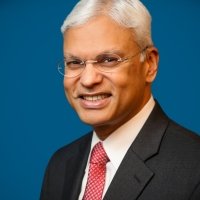Book Launch: U.S. Strategy in the Asian Century
As competition between China and the United States intensifies, and as the Indo-Pacific emerges as the world’s most strategically consequential region, Washington must adapt its approach if it seeks to preserve its power and sustain regional stability and prosperity. U.S. Strategy in the Asian Century describes how the United States can navigate profound changes to the balance of power and the nature of power, empower its allies and partners, compete effectively with China, reestablish its leadership in the region, and rebuild the liberal order for the 21st century. On August 18, author and Asia Program Director Abraham Denmark, along with a panel of other experts, discussed his new book.
Related Publication

U.S. Strategy in the Asian Century: Empowering Allies and Partners
Selected Quotes
Abraham Denmark
“Clearly, to my mind, the rise of China is one of the most significant geopolitical elements in the last twenty years. And as China’s power has risen and U.S.-China competition has intensified, scholars and policymakers have begun to look to history for lessons to inform how the U.S. should respond.”
“At its core, China is seeking what they call the Great Rejuvenation of the Chinese nation, in which China is stable and prosperous at home, and has significant external power… But for the United States, what’s important to note is this is a major power unlike anything we’ve seen before.”
“One of the points the book makes is [that] our allies and partners, some of them have real assets here—they have a lot to add. And so, for our efforts to maintain our technological edge, we need to bring our allies and partners [in] on the ground floor with the conceptual level and think about how we can work with them on developing technologies, fielding technologies—so that it’s not just a U.S. effort to maintain a technological advantage but rather it’s a U.S. plus Japan plus Australia, etc.”
“The Chinese are very good at figuring out what our priorities are, what do we really want, and then holding those things somewhat hostage to what they want. So that, for example, they’ll say we know you want to cooperate with us on North Korea, but how can we cooperate with you on North Korea if you’re still selling arms to Taiwan or meeting with the Dalai Lama, or whatever it may be. And the key there is that we have to maintain our principles and stick to our interests.”
Ashley J. Tellis
“Despite all the changes in Asia in the last thirty-odd years, I think it is still an American-dominated order that defines the landscape in the broadest sense of the Indo-Pacific. And that of course leads to the conclusion that it is also ours to lose. And that is because it is our order and that order I think has still survived.”
“Even though our geopolitical structures are constantly being challenged by China, I’m actually amazed at how much they have endured. The alliances are still in relatively decent shape, despite the efforts of President Trump. Even the alliance of Korea, which I think is at greatest risk compared to all of our other bilateral alliances in Asia, has survived to this day.”
“U.S. engagement in the economies of Asia, particularly with respect to investment, is still very strong. Now, I think a simple gravitational model of trade would predict that China will remain the largest trader in the region with respect to goods/merchandise trade. But, we can more than stand our own with respect to investment. And so, even though China is creating, inevitably, an Asian economic system that is deeply linked with China, it’s not going to be to the exclusion of the United States.”
Robert Litwak
“One area that I think that is requiring future research is your points about complex hedging strategy, because it’s really a continuum of possible relationships. And I think it’s really going to require very deft handling by a U.S. administration to manage these different portfolios and to prevent … that our allies will conclude that bandwagoning—that is, cutting the best deal they can in Beijing—is better than dealing with the U.S.”
Speakers


Hosted By

Indo-Pacific Program
The Indo-Pacific Program promotes policy debate and intellectual discussions on US interests in the Asia-Pacific as well as political, economic, security, and social issues relating to the world’s most populous and economically dynamic region. Read more
